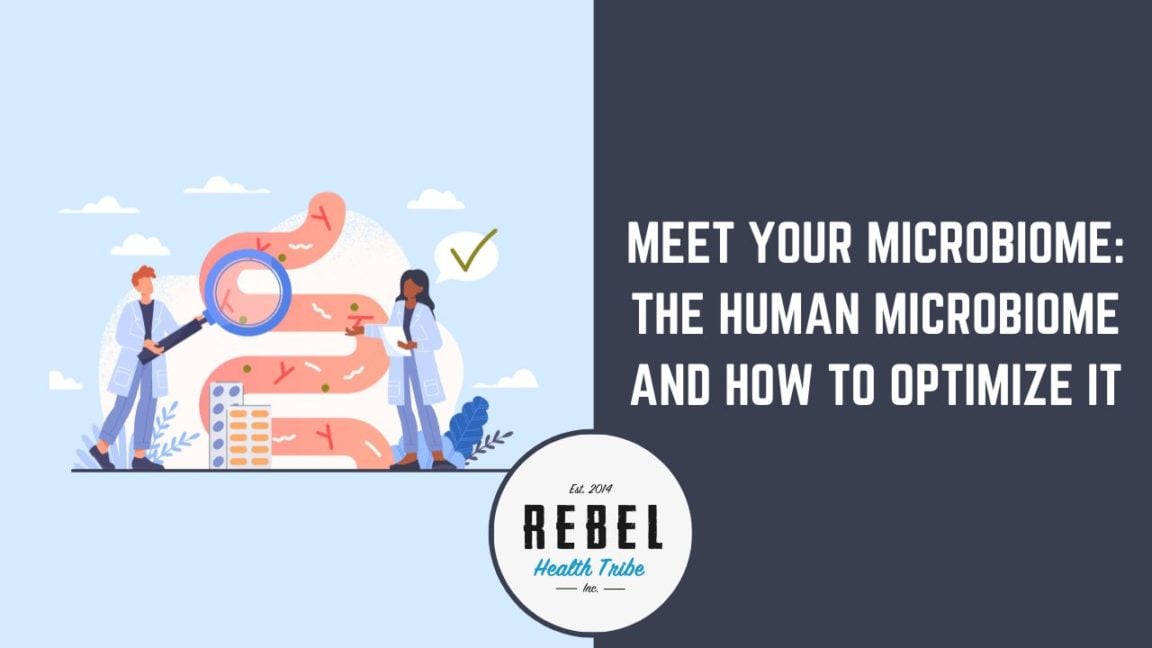
Meet Your Microbiome: The Human Microbiome and How to Optimize It
Meet Your Microbiome: The Human Microbiome and How to Optimize


Meet Your Microbiome: The Human Microbiome and How to Optimize
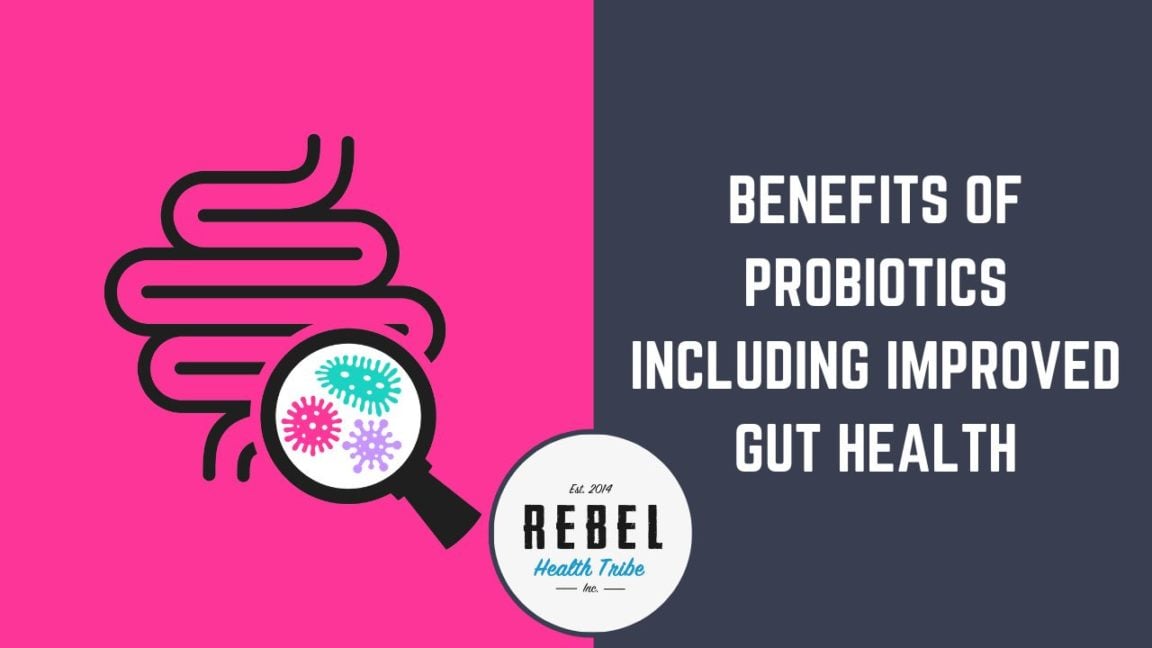
Benefits of Probiotics Including Improved Gut Health “Probiotics” has become
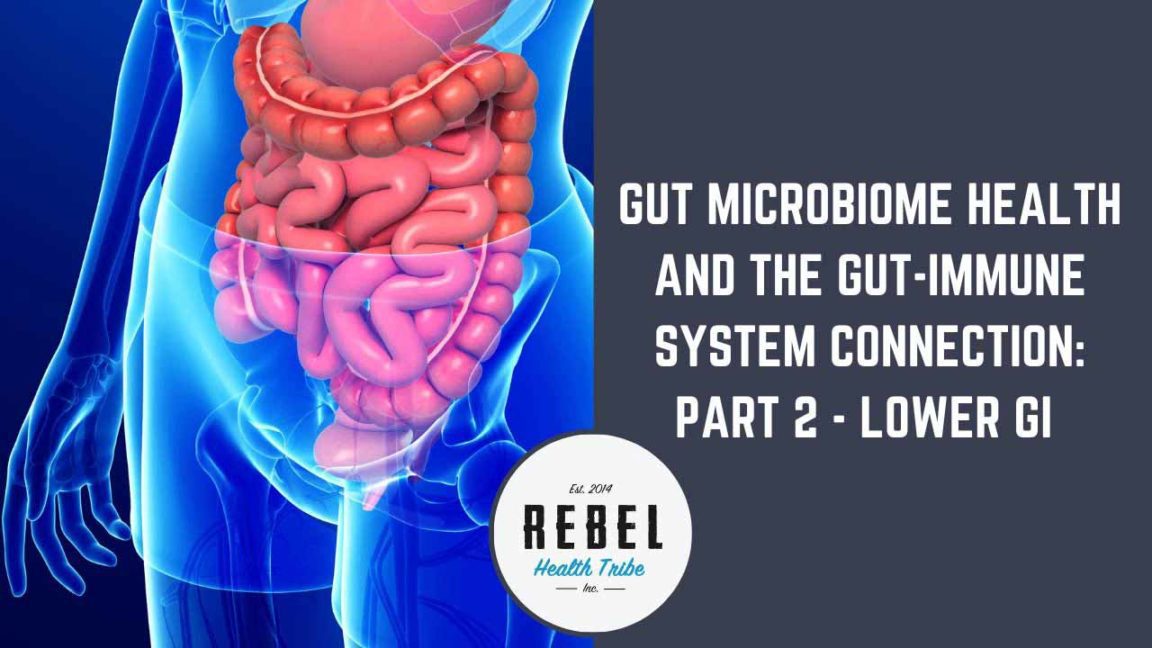
Gut Microbiome Health and the Gut-Immune System Connection: Part 2
We’ve all heard the phrase, “you are what you eat”. But a more accurate statement would be “you are what you digest”.
While at first glance, digestion might seem like a simple process, it’s a little more complicated than simply eating food, absorbing nutrients, and ultimately eliminating it when we go to the bathroom. Our digestion relies on countless moving parts and chemical reactions. And one crucial compound we depend on for these chemical reactions and proper digestion is a class of molecules known as digestive enzymes.
In this blog post, we’re going to explore exactly what digestive enzymes are, how to know if you’re experiencing an enzyme deficiency and could benefit from incorporating gut health supplements, and how to improve digestive health with these crucial catalysts.
Digestive problems have become an ever-increasing problem in our modern world. If something goes wrong in the process – like an insufficient amount of enzymes for digestion – it can have a ripple effect that can throw your entire gastrointestinal system off-kilter. Some commonly seen digestive issues that can stem from low enzyme levels include:1


If left unaddressed, these digestive problems stemming from a lack of enzymes can escalate into more serious conditions like:
So how exactly can a tiny enzyme have such a monumental impact on your gut health, digestive system function, and overall well-being? To answer that question, you first have to understand exactly what digestive enzymes are and the role they play in your digestion.
Digestive enzymes are a type of protein that’s bonded to specific minerals known as cofactors. Together, this protein and cofactors work together as a catalyst to break down food molecules into their “building block” components. Each enzyme has a specific structure or shape that allows them to bind to specific food molecules – almost like a lock and key mechanism.2
When these enzymes encounter food particles, they are able to use this lock and key arrangement to bind to the food molecules and trigger a chemical reaction – breaking down the chemical bonds within food molecules and releasing its building block components. From there, these compounds or nutrients can be absorbed into your bloodstream and utilized.
These digestive enzymes are produced throughout your gastrointestinal tract and can be found in:
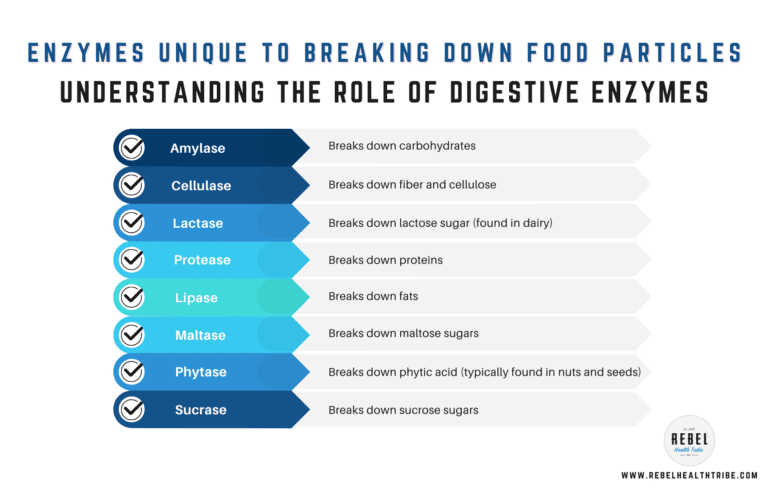
Each of these enzymes is designed to break down unique food molecules. Examples of specific digestive enzymes include: 2,3
Now let’s take a little deeper look at what happens if you have a deficiency of digestive enzymes.
Without adequate digestive enzymes to properly degrade the food you consume, you simply can’t digest food properly. It makes sense that this impaired digestion can result in decreased absorption of vital nutrients and intolerances to certain foods. But this also creates a ripple effect that goes something like this:4,5
This underlying dysbiosis and subsequent inflammation are what can lead to some of the more serious consequences seen in chronic enzyme deficiency and gut dysbiosis. So what causes an enzyme deficiency in the first place?
An enzyme deficiency and an imbalance in your gut microbiome can actually hinder your gut's ability to break down or tolerate foods that are typically considered “healthy” and “gut-healing”.
A deficiency in digestive enzymes can be caused by a number of underlying factors such as:6
Oftentimes, there’s more than one factor that contributes to a digestive enzyme deficiency. But the good news is, there are some ways to stop the vicious cycle of enzyme deficiency, gut dysbiosis, and inflammation. So let’s get into some ways to improve digestive health and increase natural digestive enzymes through the foods you eat.
Your diet and the food you eat can help naturally increase your digestive enzymes in two distinct ways. Firstly, the food you eat can help address any underlying imbalances and inflammation, and help heal your gut. Secondly, there are certain foods that serve as natural sources of digestive enzymes. Let’s look at these a little closer:
An enzyme deficiency and an imbalance in your gut microbiome can actually hinder your gut’s ability to break down or tolerate foods that are typically considered “healthy” and “gut-healing”. These foods may actually make your symptoms worse, so rather than trying to incorporate lots of healthy foods, it can be more helpful to closely monitor your response to certain foods and focus on avoiding and eliminating inflammation-causing and gut-disrupting foods like:
As your gut heals and you’re able to provide your body with adequate enzymes (either through natural production or supplementation) you should be able to slowly add in more and more foods.
Upping your intake of certain foods that naturally contain enzymes can help improve your digestion. Foods that are naturally rich in enzymes include:7
Adjusting your diet to compensate for a deficiency in digestive enzymes is a good place to start, but you’re probably wondering how to improve gut health to truly reverse your digestive woes and address the underlying issue that’s creating the enzyme deficiency. The answer may be to incorporate a digestive enzyme supplement.
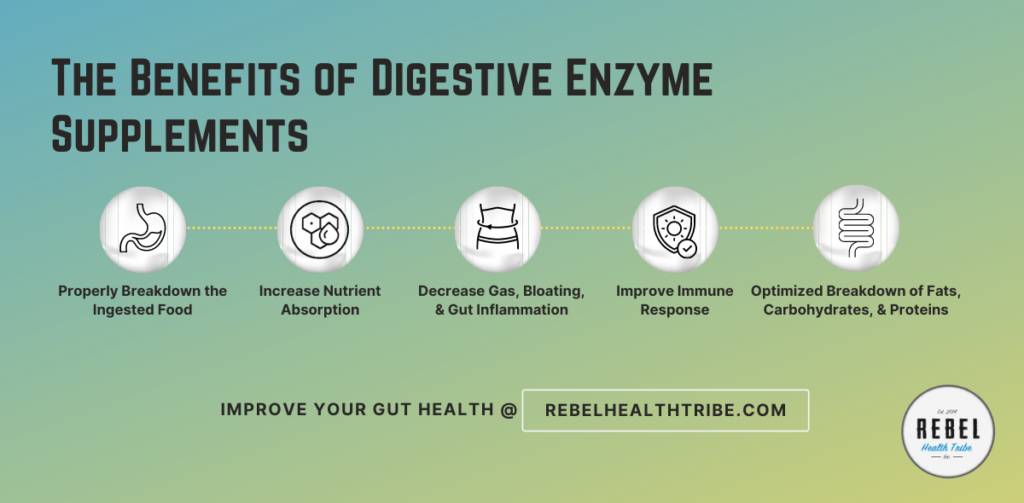
Digestive enzyme supplements can be a particularly important aspect of healing any imbalances contributing to your lack of sufficient enzyme production. Exactly how digestive enzyme supplements can help address the root cause, improve digestion, and help your body begin to increase the production of natural digestive enzymes goes something like this:
So if you’re curious about incorporating digestive enzymes to address any digestive issues you may be experiencing, you’re probably asking, “what can I expect, and when should I take digestive enzymes?”
Exactly how long digestive enzymes take to work depends on several factors. It’s not uncommon to experience almost immediate  relief when taking digestive enzymes with meals that typically trigger a flare-up of symptoms. But effects can vary depending on the amount of symptom-causing foods you ingest and just how severe your enzyme deficiency is.
relief when taking digestive enzymes with meals that typically trigger a flare-up of symptoms. But effects can vary depending on the amount of symptom-causing foods you ingest and just how severe your enzyme deficiency is.
As you support your gut in the process of healing and returning to equilibrium, digestive enzyme benefits and potency typically increase as your natural ability to break down food grows. But in order to ensure you actually reap the full spectrum of digestive enzyme benefits, it’s important to understand how to choose digestive enzymes.
Not all digestive enzymes are created equally. Many digestive enzymes that you’ll find lining the shelves of supplement stores provide inconsistent results – often providing little to no benefits or relief from symptoms. So what gives and how do you find digestive enzymes that actually work?
The secret to finding digestive enzymes that truly work lies in cofactors – the specific minerals that are bound to the protein molecules that make up enzymes. You see, each enzyme needs a very specific type and ratio of mineral cofactors to be activated or “turned on”. Without a perfectly calibrated pairing of protein and cofactors, a digestive enzyme’s efficacy is entirely hit or miss.
But when cofactors are properly paired and activated, it has remarkable results – giving your digestive system the support it needs to break down food, absorb nutrients, and create a balanced, diverse, and flourishing microbiome. And as of now, there is only one brand of digestive enzymes that has cracked the code on enzyme activation.
HoloZyme digestive enzymes by Healthy Gut Company are the most activated and most effective digestive enzymes available on the market. HoloZyme’s dual-strain Activ-Blend enzymes combines:
On top of being the only patented “activated enzyme” formula, HoloZyme’s one-of-a-kind digestive enzyme supplements are also backed by a whopping 6 pilot clinical studies. This enzyme formula has been clinically proven to significantly improve digestive health, alleviate symptoms of enzyme deficiency, increase microbiome diversity, and improve biomarkers of overall health (like blood sugar, triglycerides, and uric acid).
To learn more about HoloZyme enzymes and how this patented formula was created, you can head over and check out our webinar replay Digestive Enzymes: A Powerful Tool for Optimizing Your Digestion. In this webinar, we sit down with Steve Wright, founder of Healthy Gut and formulator of HoloZyme, and discuss exactly what makes this one-of-a-kind formula so powerful.
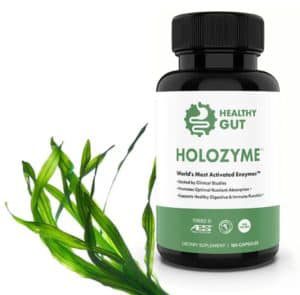
Your gut health and ability to properly digest the food you consume are foundational to your well-being and experiencing the vitality and abundant health you deserve. So if you’re struggling with persistent gut issues, an underlying digestive diagnosis, or just feel like your gut health could use a tune-up, chances are you could benefit from incorporating HoloZyme Digestive Enzymes into your wellness routine.
This patented blend of digestive enzymes is simply the most powerful and effective enzyme supplement ever created. HoloZyme digestive enzymes also have a two-year shelf-life and are free of all major allergens, contain zero sugar, and are GMO-free – making them easy to incorporate into your supplement regimen. If you want a truly thriving and healthy gut, HoloZyme Enzymes might just be the missing puzzle piece you need.
So if you’re ready to experience the power of HoloZyme digestive enzymes, you can grab your own bottle by clicking right here. You can find HoloZyme digestive enzymes + more information through our online shop. As always, our mission is to empower you with the knowledge and resources you need to create abundant health, vitality, and happiness. So if you enjoyed this article and you’re ready to dig deeper, we’ve got lots of helpful science-backed resources available on the blog and in the Wellness Vault to help you take your healing and health to the next level.
ZenBiome™ Sleep is formulated to help clients deal with occasional...
An Exclusive Course with 10 Years of Microbiome
If you’ve ever wanted all of Kiran’s best
The toxicity and Detoxification Masterclass covers a wide
19 Leading Experts Share Cutting-Edge Science, Effective Practices,
Autoimmune Masterclass brings together 17 of the world’s
If you get fatigued, flushed, or foggy after...
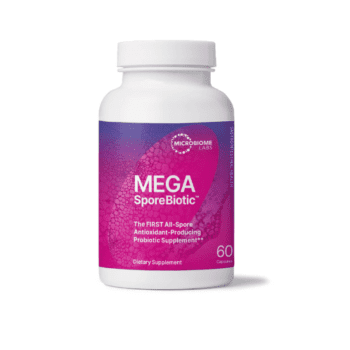
MegaSporeBiotic™ is a 100% spore-based, broad-spectrum probiotic shown...
MegaSporeBiotic™ Gummies are a 100% spore-based proprietary probiotic...
MegaMucosa is the first complete mucosal support supplement...
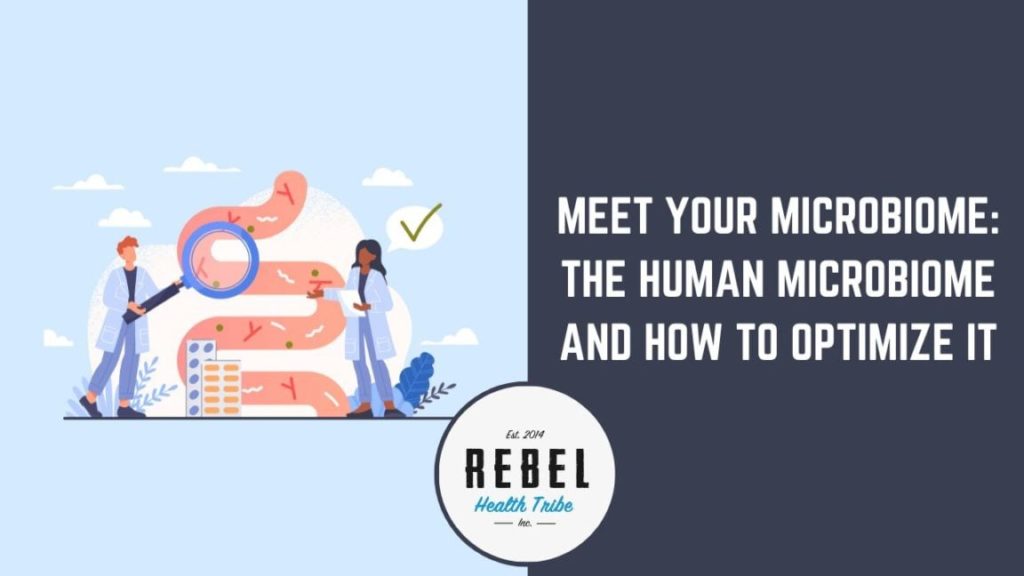
Meet Your Microbiome: The Human Microbiome and How to Optimize It On and in the average human, there reside approximately
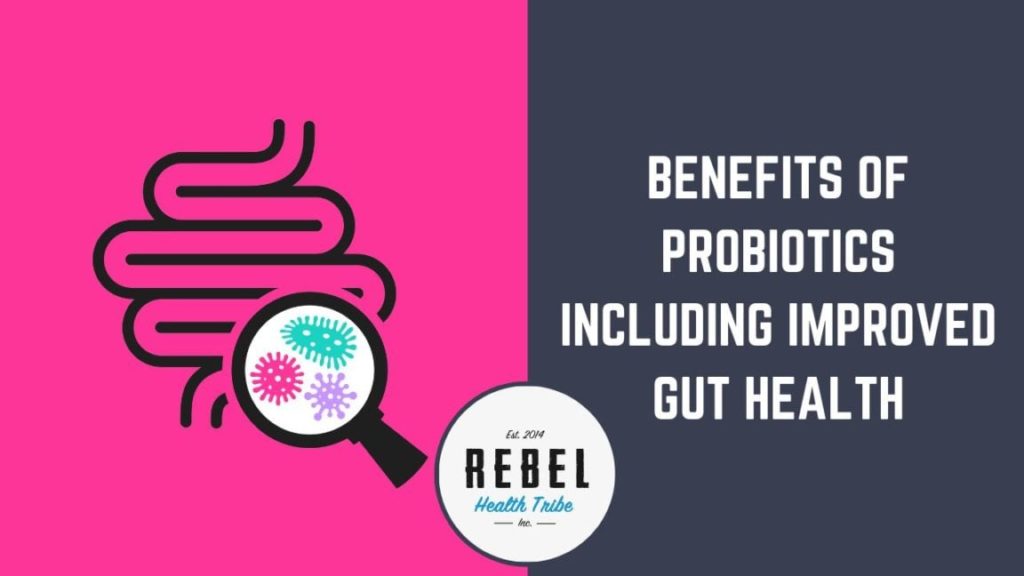
Benefits of Probiotics Including Improved Gut Health “Probiotics” has become quite the buzzword – with countless products and supplements proudly
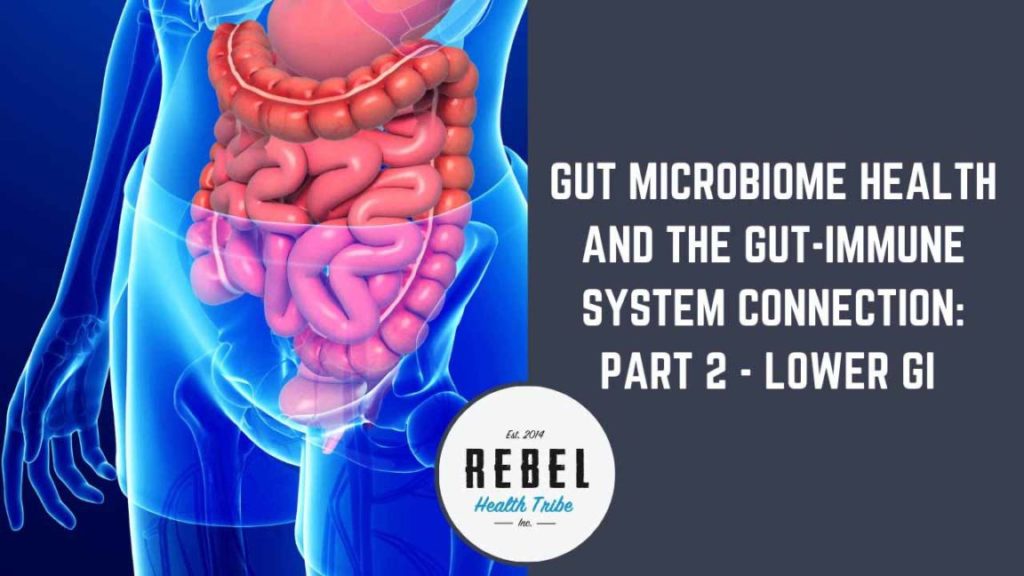
Gut Microbiome Health and the Gut-Immune System Connection: Part 2 Lower GI The diverse community of microbes in your digestive
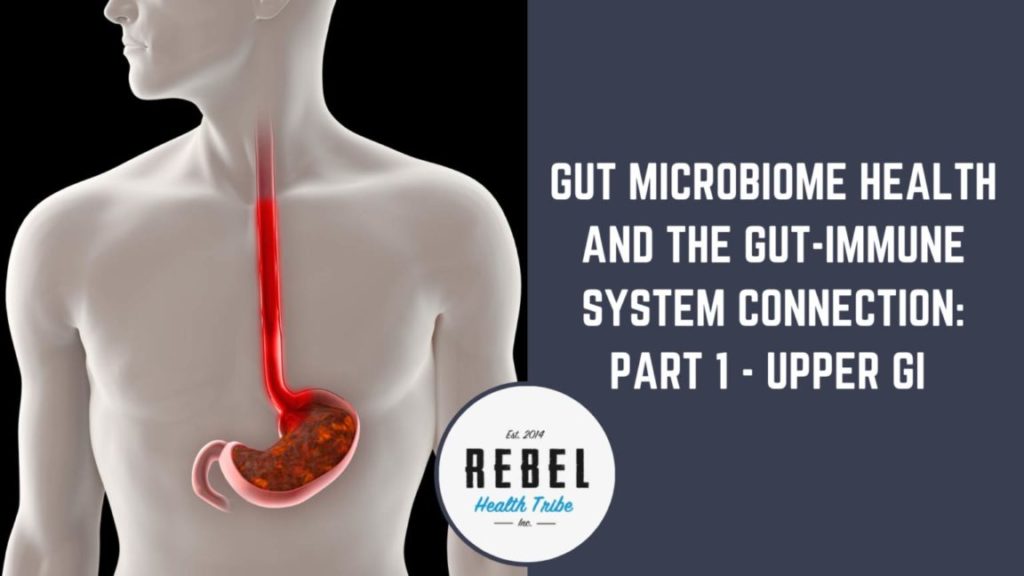
Gut Microbiome Health and the Gut-Immune System Connection: Part 1 Upper GI The message is out: gut health is critical